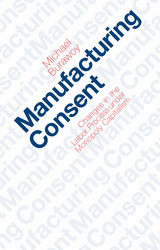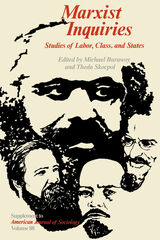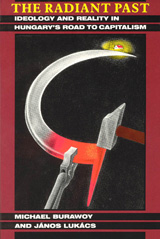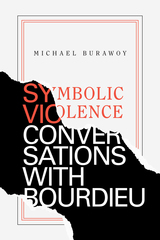4 books about Burawoy, Michael

Manufacturing Consent
Changes in the Labor Process Under Monopoly Capitalism
Michael Burawoy
University of Chicago Press, 1982
Since the 1930s, industrial sociologists have tried to answer the question, Why do workers not work harder? Michael Burawoy spent ten months as a machine operator in a Chicago factory trying to answer different but equally important questions: Why do workers work as hard as they do? Why do workers routinely consent to their own exploitation?
Manufacturing Consent, the result of Burawoy's research, combines rich ethnographical description with an original Marxist theory of the capitalist labor process. Manufacturing Consent is unique among studies of this kind because Burawoy has been able to analyze his own experiences in relation to those of Donald Roy, who studied the same factory thirty years earlier. Burawoy traces the technical, political, and ideological changes in factory life to the transformations of the market relations of the plant (it is now part of a multinational corporation) and to broader movements, since World War II, in industrial relations.
Manufacturing Consent, the result of Burawoy's research, combines rich ethnographical description with an original Marxist theory of the capitalist labor process. Manufacturing Consent is unique among studies of this kind because Burawoy has been able to analyze his own experiences in relation to those of Donald Roy, who studied the same factory thirty years earlier. Burawoy traces the technical, political, and ideological changes in factory life to the transformations of the market relations of the plant (it is now part of a multinational corporation) and to broader movements, since World War II, in industrial relations.
[more]

Marxist Inquiries
Studies of Labor, Class, and States
Edited by Michael Burawoy and Theda Skocpol
University of Chicago Press, 1983
This collection exemplifies the resurgence of Marxist ideas in contemporary social research. Its purpose is neither to cover all the areas of Marxist research nor to survey alternative Marxist perspectives or schools. Rather the volume assembles nine examples of the most interesting work being done today by younger sociologists who are seriously pursuing the rich and provocative arguments to be found in the ongoing Marxist tradition. All contributions build upon or react to Marxist theoretical perspectives. They employ such diverse research techniques as participant observation, statistical analysis, interviewing, and the examination of archives of public documents. Among the topics covered:
– the economic bases of state policies and their determination by social and political struggles;
– the politcal reshaping of international economic order;
– industrial work in relation to other institutions (such as education, patriarchy, and citizenship);
– the transformation of class structures in capitalist and state-socialist societies.
Published as a supplement to American Journal of Sociology, these studies constitute essential reading both for those sociologists who see Marxism as a powerful framework for understanding capitalist societies and for those who may not be committed to working within the Marxist tradition but nevertheless want to see Marxist hypotheses fully researched and debated.
– the economic bases of state policies and their determination by social and political struggles;
– the politcal reshaping of international economic order;
– industrial work in relation to other institutions (such as education, patriarchy, and citizenship);
– the transformation of class structures in capitalist and state-socialist societies.
Published as a supplement to American Journal of Sociology, these studies constitute essential reading both for those sociologists who see Marxism as a powerful framework for understanding capitalist societies and for those who may not be committed to working within the Marxist tradition but nevertheless want to see Marxist hypotheses fully researched and debated.
[more]

The Radiant Past
Ideology and Reality in Hungary's Road to Capitalism
Michael Burawoy and János Lukács
University of Chicago Press, 1992
Communism, once heralded as the "radiant future" of all humanity, has now become part of Eastern Europe's past. What does the record say about the legacy of communism as an organizational system?
Michael Burawoy and Janos Lukacs consider this question from the standpoint of the Hungarian working class. Between 1983 and 1990 the authors carried out intensive studies in two core Hungarian industries, machine building and steel production, to produce the first extended participant-observation study of work and politics in state socialism.
"A fascinating and engagingly written eyewitness report on proletarian life in the waning years of goulash communism. . . . A richly rewarding book, one that should interest political scientists in a variety of subfields, from area specialists and comparativists to political economists, as well as those interested in Marxist and post-Marxist theory."—Elizabeth Kiss, American Political Science Review
"A very rich book. . . . It does not merely offer another theory of transition, but also presents a clear interpretive scheme, combined with sociological theory and vivid ethnographic description."—Ireneusz Bialecki, Contemporary Sociology
"Its informed skepticism of post-Communist liberal euphoria, its concern for workers, and its fine ethnographic details make this work valuable."—"àkos Róna-Tas, American Journal of Sociology
Michael Burawoy and Janos Lukacs consider this question from the standpoint of the Hungarian working class. Between 1983 and 1990 the authors carried out intensive studies in two core Hungarian industries, machine building and steel production, to produce the first extended participant-observation study of work and politics in state socialism.
"A fascinating and engagingly written eyewitness report on proletarian life in the waning years of goulash communism. . . . A richly rewarding book, one that should interest political scientists in a variety of subfields, from area specialists and comparativists to political economists, as well as those interested in Marxist and post-Marxist theory."—Elizabeth Kiss, American Political Science Review
"A very rich book. . . . It does not merely offer another theory of transition, but also presents a clear interpretive scheme, combined with sociological theory and vivid ethnographic description."—Ireneusz Bialecki, Contemporary Sociology
"Its informed skepticism of post-Communist liberal euphoria, its concern for workers, and its fine ethnographic details make this work valuable."—"àkos Róna-Tas, American Journal of Sociology
[more]

Symbolic Violence
Conversations with Bourdieu
Michael Burawoy
Duke University Press, 2019
In Symbolic Violence Michael Burawoy brings Pierre Bourdieu into an extended debate with Marxism—a tradition Bourdieu ostensibly avoided. While Bourdieu's expansive body of work stands as a critique of Marx's inadequate account of cultural domination, Burawoy shows how Bourdieu's eschewal and rejection of Marxism led him to miss out on a number of productive theoretical engagements. In eleven “conversations,” Burawoy outlines the intellectual and biographical parallels and divergences between Bourdieu and the work of preeminent Marxist thinkers. Among many topics, Burawoy examines Bourdieu's appropriation and silencing of Beauvoir and her theory of masculine domination; the commonalities as well as differences in Bourdieu's and Fanon's thought on colonialism and revolution; the extent to which Gramsci's theory of hegemony aligns with Bourdieu's notion of symbolic violence; and both how Freire and Bourdieu understood education as the site of oppression. In showing how Bourdieu has more in common with these thinkers than Bourdieu himself cared to admit, Burawoy offers a critical assessment of Bourdieu's work that illuminates its paradoxes and reaffirms its significance for the twenty-first century.
[more]
READERS
Browse our collection.
PUBLISHERS
See BiblioVault's publisher services.
STUDENT SERVICES
Files for college accessibility offices.
UChicago Accessibility Resources
home | accessibility | search | about | contact us
BiblioVault ® 2001 - 2024
The University of Chicago Press









